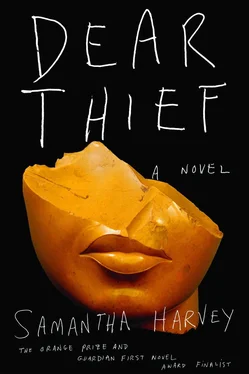Beggar’s spoils, you called all the useless things he collected. Broken relics of man’s washed-up endeavours on the shores of the Thames, and the flint, coral and graptolite he dug up in the woods upriver from Morda. Nicolas’ sorry old beggar’s spoils, you said, which was frankly uncharitable. You told me, in his presence, never to trust a man who forages in the substrate. He answered only that I should never trust a woman who tells another woman what she should never trust in a man. It was not his way to rise to your or anyone’s bait, and I respected this about him. He knew he had some lonely and pedantic habits that hardly needed a psychologist’s eye to be seen for what they were — digging in the soil, scratching at limestone for fossils, mudlarking on the shores of the Thames for washed-up trinkets. Each boy needs his father; those who have lost hope of ever having one never stop looking for something else instead.
But even in full awareness of how open he was to mockery, from you especially, he was not ashamed of what he did. No, he only talked more about its subtleties, which felt to me curiously brave. He called these surfacings of fossils and flint unmanned miracles . He said that nature was pushing its bounty up through the soil, silt and mud and that people like him who collected it were less archaeologists and more flower-pickers. Sooner or later each thing under the ground would bloom above it, and whoever had his fingers ready to pluck would be the one rewarded. And he felt that if he waited long enough each treasure would have its season and what was missing would surface, including therefore the other half of his figurine; he didn’t ever seem to doubt its appearance, or worry that his fingers would not be the ones hovering when it did.
‘Flower-pickers!’ you would tease. ‘Our own little florist of the river shore.’ With this reproach you would tussle his hair or press your thumb along his eyebrow as though neatening a child. To which he would respond without words, more with an amused smile — the sexily boyish, playful smile that you and I once agreed was his trademark. You will remember that once he went upstairs, brought down his box of beggar’s spoils and laid them on the kitchen table in front of you. Flint, coral, porcelain, coloured glass, metal deer brooch, dagger, trilobite, gemstone, dog tag, watch battery, leather sandal, plastic button, gun, pin, bone. And he asked you to take your pick. Of course you picked the gun, a Mauser C-96, a German piece from the First World War that he had found on the north bank of the Thames. You thought it was wonderful. You lifted it to your head with a rueful grin and pretended to shoot yourself.
This was something I loved about Nicolas, that he would not be bullied, that he made the bully rueful, but never took pleasure in doing it. He was — is — a sincere man at heart. That is the thing.
Yannis sells the best fried squid, marinated anchovies, salted sardines and unleavened bread in the whole of London — he says the whole of England. He also says this isn’t saying much. He has a griddle in the tiny kitchen area behind the counter, where he fries the squid to order and sells it in a greaseproof paper bag. Occasionally I go to his shop in the evening when he is about to close and buy a bag at a discount, and eat it on the way home. Yesterday evening he asked me to stay for a few minutes because he had something he wanted to discuss, so we sat at one of the two high, round tables in the window, with a glass of beer each and a plate of bread and anchovies, and he asked me what a man had to do to get his wife back.
‘I think begging is the only way,’ I said, but he had tried that. He came to England four years ago because his wife had got a job as an oncologist in a hospital here, but now she was the one who couldn’t settle and wanted to go home, while he had built a business from scratch and wanted to stay. She says it is his fault they can’t go back to Crete, his stubbornness. He says she is unreasonable to drag him all the way here only to drag him back. He has been working through a stack of English modernist novels in a bid to anglicise himself — he has laboured through page after bewildering page and learnt phrases like ‘a pint of porter’ and ‘the industrial epoch’; words like ‘brat’ and ‘rascal’ and ‘ghastly’ and ‘nothingness’. She cannot tell him this effort has been for nothing?
After months of arguing to what has become a script, she has gone. Except not to Crete, but to her sister’s friend’s house in Muswell Hill. ‘Muswell Hill!’ he said to me. ‘This is bloody ghastly .’ Unknowingly he pressed his thumb into an anchovy’s face as he said that, because he was gripping the rim of his plate. So I removed the thumb and squeezed his hand. ‘It is not the anchovy’s fault,’ I told him, and he looked at his plate, at the wretched flattened fish, and muttered a string of apologies.
The upshot is that he asked me to write to his wife and point out his virtues. Like a letter of recommendation. I told him I could not; it wouldn’t work. Let’s put aside the fact that she is his wife, and if she hasn’t seen his virtues yet she may never do so. The finer point is that women are loath to accept the recommendations of other women. He seemed intrigued to be told something about what women do and don’t do, and looked at me brightly, like a dog that has seen its lead. But the truth is I have no other insights to share with him, and I told him that — not only can I shed no light on womankind, but I also know nothing about relationships except for some faint grasp of the multiple ways they can go wrong.
‘But people like you,’ he said, ‘who have been married and divorced, you know things the rest of us don’t.’ I suggested that a special knowledge of failure is not such a valuable thing, and besides, I was never actually divorced, only separated. After a moment of surprise he seemed genuinely disappointed. ‘You mean you’re still technically married? After ten years of being apart?’ ‘Actually it’s fifteen years,’ I said, and I tried to explain that while it only requires a single yes to get married, to get divorced you have to say no so many times in so many different ways, and so expensively, that it does not always seem worth the trouble. Marriage is a construct easily put together, and painstakingly dismantled. The law makes it this way. To prise it apart, legally speaking, you have to take to it with a sledgehammer as if it were your worst enemy you were obliterating, and not the remains of your tenderest dreams. Not the little patch of fertile ground your only child sprang from. Nicolas and I could never bring ourselves to do that, that’s all. Is it so strange?
You will see my cunning here, as if my agenda is to relate to you in passing a conversation I had with Yannis, when really of course I am using it as an opportunity to tell you something. I just thought you might be wondering what had happened between Nicolas and me after you left. Sometimes I wonder if you assume we carried on as if nothing had happened, and there is a part of me that likes you to think that, and a part of you — a caring part of you — that probably likes to think that too. And it is true that I do still see him from time to time now that we both live in London. Anyway, I suspect I overstated the point when I said what I did about tender dreams, because Yannis poured the last of his beer into my glass with great, warm compassion — and I suppose I should mention that for him to appear compassionate is a triumph of character over looks, because he is in fact made like a warlord, with a long straight nose that is almost vertical and a forehead that slopes back alarmingly — and said that he thought it must be chilly, to be in a marriage that is over but not ended. Because the other has left, he ventured. They have left, but not shut the door. It must be like living in a room with a draught always coming in. His big, savage, Cretan face winced at the thought.
Читать дальше












